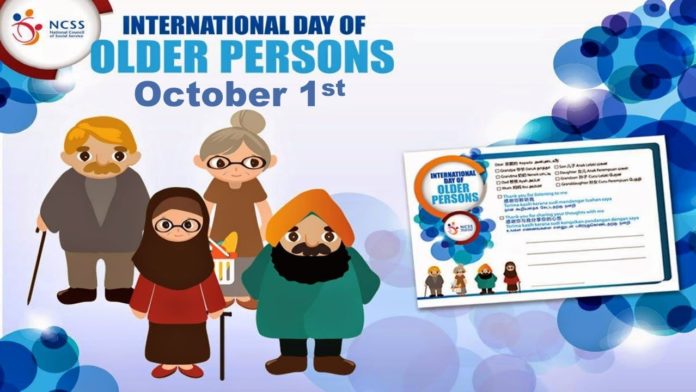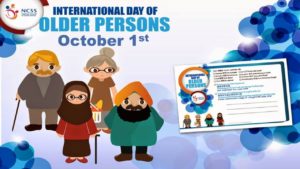The International Day of Older Persons is observed on October 1 each year. The theme for 2016 is “Take A Stand Against Ageism”
About Day of Older Persons :
On December 14, 1990 the United Nations General Assembly voted to establish October 1 as the International Day of Older Persons as recorded in Resolution 45/106. The holiday was observed for the first time on October 1, 1991.
- The holiday is celebrated by raising awareness about issues affecting the elderly, such as senescence and elder abuse. It is also a day to appreciate the contributions that older people make to society.
- This holiday is similar to National Grandparents Day in the United States and Canada as well as Double Ninth Festival in China and Respect for the Aged Day in Japan. The observance is a focus of ageing organizations and the United Nations Programme on Ageing.
- The 2016 United Nations International Day of Older Persons (UNIDOP) will take a stand against ageism by drawing attention to and challenging negative stereotypes and misconceptions about older persons and ageing.

- Ageism is a widely prevalent and prejudicial attitude that stems from the assumption that age discrimination, and sometimes neglect and abuse of older persons is a social norm and therefore, acceptable. It is a reality in some form in all societies, and finds expression in individuals’ attitudes, institutional and policy practices, as well as media representation that devalue and exclude older persons.
- In 2014, Governments around the world adopted a resolution at the Economic and Social Council that recognized ageism as “the common source of, the justification for and the driving force behind age discrimination.”
- Such discrimination shapes how older persons are treated and perceived by their societies, including in medical settings and workplaces, creating environments that limit older persons’ potential and impact their health and well-being. The failure to tackle ageism undermines older persons’ rights and hinders their contributions to social, economic, cultural and political life.
Understanding the roles of older persons in family and society
Government institutions have chosen diverse approaches in setting priorities. These choices highlight different perceptions of the role that older people play in the family and in society at large.
- In some cases, measures aim to capture the rapidly evolving dynamics of communities and societies, inviting a second look at current perceptions about older persons and work, elder-care mechanisms, intergenerational support systems and financial constraints. Some Governments have designed policies founded on the principle of active ageing and autonomy, aimed at facilitating the continuation of independent lives at home, with services and facilities that cater for various types of needs.
- Others emphasize family ties and support for the family unit as the primary source of care for older persons. In all cases, a network of private actors, including various volunteer organizations and community-based centres, are essential to the smooth functioning of the entire system.
- Of special resonance is the situation of older women who face inequalities as a result of their gender-based roles in society. Gender relations structure the entire life cycle, influencing access to resources and opportunities, with an impact that is both ongoing and cumulative. The different circumstances that shape the lives of women and men in old age are the outcome of a lifetime of experience.
- Good health, economic security, adequate housing, an enabling environment, access to land or other productive resources, these are the fundamentals of ageing with dignity, yet achieving them depends on decisions and choices only partly determined by each individual. The impact of gender inequalities in education and employment becomes most pronounced in old age.
- As a result, older women are more likely than older men to be poor. Furthermore, older women often take on greater responsibilities for family care while managing inflexible working conditions, mandatory retirement ages and inadequate pensions and other social security benefits, which leave them, and those in their care, extremely vulnerable.
- Without doubt, ageing, its human rights challenges and its feminization constitute an unprecedented shift in the social fabric of all societies, with far-reaching consequences.
President presented ‘Vayoshreshtha Samman’ To older persons :
The President of India Shri Pranab Mukharjee presented the National Awards for Senior Citizens“Vayoshreshtha Samman-2016”to eminent senior citizens and institutions in recognition of their service towards the cause of elderly persons, especially indigent senior citizens at a function organized by the Ministry of Social Justice & Empowerment.
- Union Minister for Social Justice & Empowerment Shri Thawaarchand Gehlot presided over the function.
- The President addressed that the Ministry of Social Justice and Empowerment is doing a good job by providing various reliefs to the elderly in society. The efforts of the Ministry are being complemented by other Ministries of the Government of India but the problem is gigantic.
- Senior citizens in our country – that is, the segment of our population that is aged above 60 years, numbers about ten and half crores. Of these, 5.1 crore are male and 5.3 crores are female.
Mobile Application For Senior Citizens Launched
Delhi Police launched a mobile application for senior citizens to enable them to reach out to the police quickly in emergency situations.
- On the occasion of the International Day of Older Persons, the app ‘Delhi Police Senior Citizen’ was launched by Delhi Lt Governor Najeeb Jung and Police Commissioner Alok Kumar Verma in the presence of senior police officials.
- It will serve as an aid to the elderly in times of distress or in case of medical emergencies.
- They will be able to send an SOS through the application that will immediately be transferred to the SHO and beat constable concerned.






